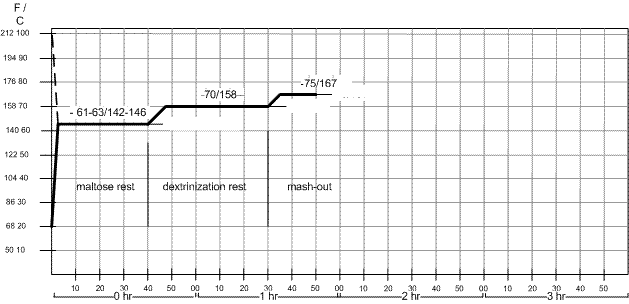So I've been doing some studying up and found a great site Braukaiser http://www.braukaiser.com/wiki/index.php/Main_Page
I've found that the most popular mash used by German breweries today is the Hochkurz (high-short) mashing schedule.
It's an infusion mash and instead of just mashing at some mid range such as 65 degrees celsius, you use three 'rests'
A maltose rest at 63 degrees for half an hour to produce maltose
A dextrin rest at 70 degrees for half an hour to convert the rest of the starch to dextrins etc
A mashout at over 75 degrees

Heat strike liquor to around 67 degrees
Fit bag and dough in. I hit 63 spot on - it's a bit cool here ATM and the grain was coolish
Lag the urn and rest for 30 mins
Lift the bag off the electric element and raise to 71 degrees with a good pumping. I hit it first off, but it could take a couple of tries.
Lag the urn and rest for 30 mins
Lift the bag off the electric element and give it a good surge for about 10 minutes to get the mash to around 78 degrees.
Give wort good pumping, lag the urn again and go to ALDI (actually not required, but it can sit there for a while as enzymes should be zapped)
I'm currently boiling, and it's smelling like malt heaven - it's a Munich Dunkel:
4.00 kg Pale Malt, Galaxy (Barrett Burston) (3.0 EBC) Grain 65.47 %
1.00 kg Munich Malt - 20L (39.4 EBC) Grain 16.37 %
0.50 kg Cara-Pils/Dextrine (3.9 EBC) Grain 8.18 %
0.30 kg Crystal Malt Dark (240.0 EBC) Grain 4.91 %
0.25 kg Caramel Wheat Malt (90.6 EBC) Grain 4.09 %
0.06 kg Carafa II (811.6 EBC) Grain 0.98 %
20.00 gm Northern Brewer [8.50 %] (60 min) Hops 16.6 IBU
20.00 gm Hallertauer, New Zealand [8.50 %] (20 min) Hops 10.0 IBU
8.00 gm Tettnang [4.50 %] (20 min) Hops 2.1 IBU
Beer Profile
Est Original Gravity: 1.060 SG
Est Final Gravity: 1.016 SG
Estimated Alcohol by Vol: 5.84 %
Bitterness: 28.7 IBU Calories: 90 cal/l
Est Color: 34.5 EBC
Drinking a pint of Ralph's ESB he sent me :twisted: